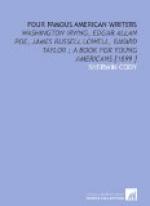His bachelor dreams were soon dissipated, however. He went to visit a friend of his, W.A. White, and there met the young man’s sister Maria. He thought her a very pleasant and pleasing young lady, and he discovered that she knew a great deal of poetry. She could repeat more verse than any other one of his acquaintances, though he laments that she was more familiar with modern poets than with the “pure wellsprings of English poesy.”
The friendship grew apace. In the same fall that he began the pretended practice of law he became engaged to her, and she caused a fresh and voluminous outpouring of verse. His productions were printed in various periodicals, such as the Knickerbocker Magazine, to which Longfellow had contributed, and the Southern Literary Messenger, which Poe once edited.
Miss White was a most charming and interesting young lady. She was herself a poet, and had a delicate intellectual sympathy that enabled her to enter into her lover’s ambitions, and assist him even in the minutest details of his work.
It is fair to suppose that Lowell’s friends brought every possible pressure to bear upon him to make him give up poetry and dig at the law. His father’s financial losses had left him without an inherited income; he was engaged to a beautiful girl and anxious to be married; in some way he must earn his living, and if possible do more. Such was not the effect, however. He devoted himself to poetry with an almost feverish activity. He has made up his mind that he will do something great; for only so can he hope possibly to make literature a paying profession.
It was Maria who inspired most of his verse at this time. One of his best poems even to this day was written directly for her. It is called “Irene’.” It may be taken as the best possible description of his lady herself:
Hers is a spirit deep, and crystal-clear;
Calm beneath her earnest face
it lies,
Free without boldness, meek without a
fear,
Quicker to look than speak
its sympathies;
Far down into her large and patient eyes
I gaze, deep-drinking of the
infinite,
As, in the mid-watch of a clear, still
night,
I look into the fathomless
blue skies.
As the struggle between money and law on the one side and literature on the other still went on, he expressed his feelings on the subject to his friend Loring in the following stanza, which puts the whole argument into a nutshell:
They tell me I must study law.
They say that I have dreamed and dreamed
too long,
That I must rouse and seek
for fame and gold;
That I must scorn this idle gift of song,
And mingle with the vain and proud and
cold.
Is, then, this
petty strife
The end and aim
of life,
All that is worth the living for below?
O God! then call me hence, for I would
gladly go!
Thus he had finally come to the conclusion that he would rather die than give up literature.




